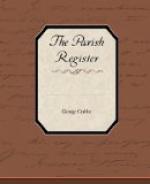PART I.
Tum porro puer (ut saevis projectus ab undis,
Navita) nudus humi jacet infans indigus omni
Vitali auxilio, —
Vagituque locum lugubri complet, ut aequum est,
Cui tantum in vita restat transire malorum.
Lucretius,
De Rerum Natura, lib.5
The argument.
The Village Register considered, as containing principally the Annals of the Poor—State of the Peasantry as meliorated by Frugality and Industry—The Cottage of an industrious Peasant; its Ornaments—Prints and Books—The Garden; its Satisfactions—The State of the Poor, when improvident and vicious—The Row or Street, and its Inhabitants—The Dwellings of one of these—A Public House— Garden and its Appendages—Gamesters; rustic Sharpers &c.— Conclusion of the Introductory Part.
Baptisms.
The Child of the Miller’s Daughter, and Relation of her Misfortune— A frugal Couple; their Kind of Frugality—Plea of the Mother of a natural Child; her Churching—Large Family of Gerard Ablett: his apprehensions: Comparison between his state and that of the wealthy Farmer his Master: his Consolation—An Old Man’s Anxiety for an Heir: the Jealousy of another on having many—Characters of the Grocer Dawkins and his Friend; their different Kinds of Disappointment—Three Infants named—An Orphan Girl and Village School-mistress—Gardener’s Child: Pedantry and Conceit of the Father: his botanical Discourse: Method of fixing the Embryo-fruit of Cucumbers—Absurd Effects of Rustic Vanity: observed in the names of their Children—Relation of the Vestry Debate on a Foundling: Sir Richard Monday—Children of various Inhabitants—The poor Farmer—Children of a Profligate: his Character and Fate— Conclusion.
The year revolves, and I again explore
The simple Annals of my Parish poor;
What Infant-members in my flock appear,
What Pairs I bless’d in the departed year;
And who, of Old or Young, or Nymphs or Swains,
Are lost to Life, its pleasures and its pains.
No Muse I ask, before my view to
bring
The humble actions of the swains I sing. —
How pass’d the youthful, how the old their days;
Who sank in sloth, and who aspired to praise;
Their tempers, manners, morals, customs, arts,
What parts they had, and how they ’mploy’d
their parts;
By what elated, soothed, seduced, depress’d,
Full well I know-these Records give the rest.
Is there a place, save one the poet
sees,
A land of love, of liberty, and ease;
Where labour wearies not, nor cares suppress
Th’ eternal flow of rustic happiness;
Where no proud mansion frowns in awful state,
Or keeps the sunshine from the cottage-gate;
Where young and old, intent on pleasure, throng,
And half man’s life is holiday and song?
Vain search for scenes like these! no view appears,
By sighs unruffled or unstain’d by tears;




